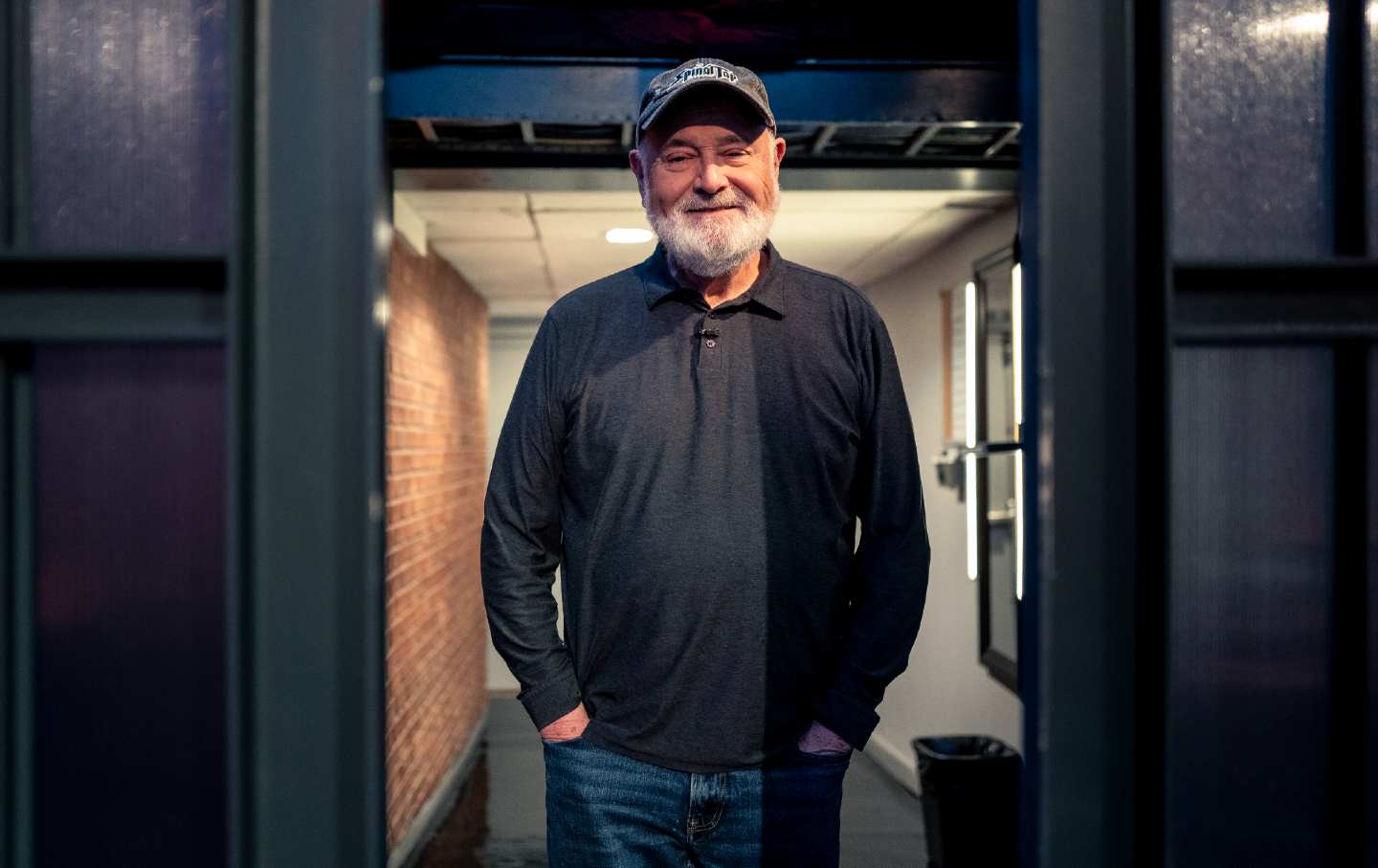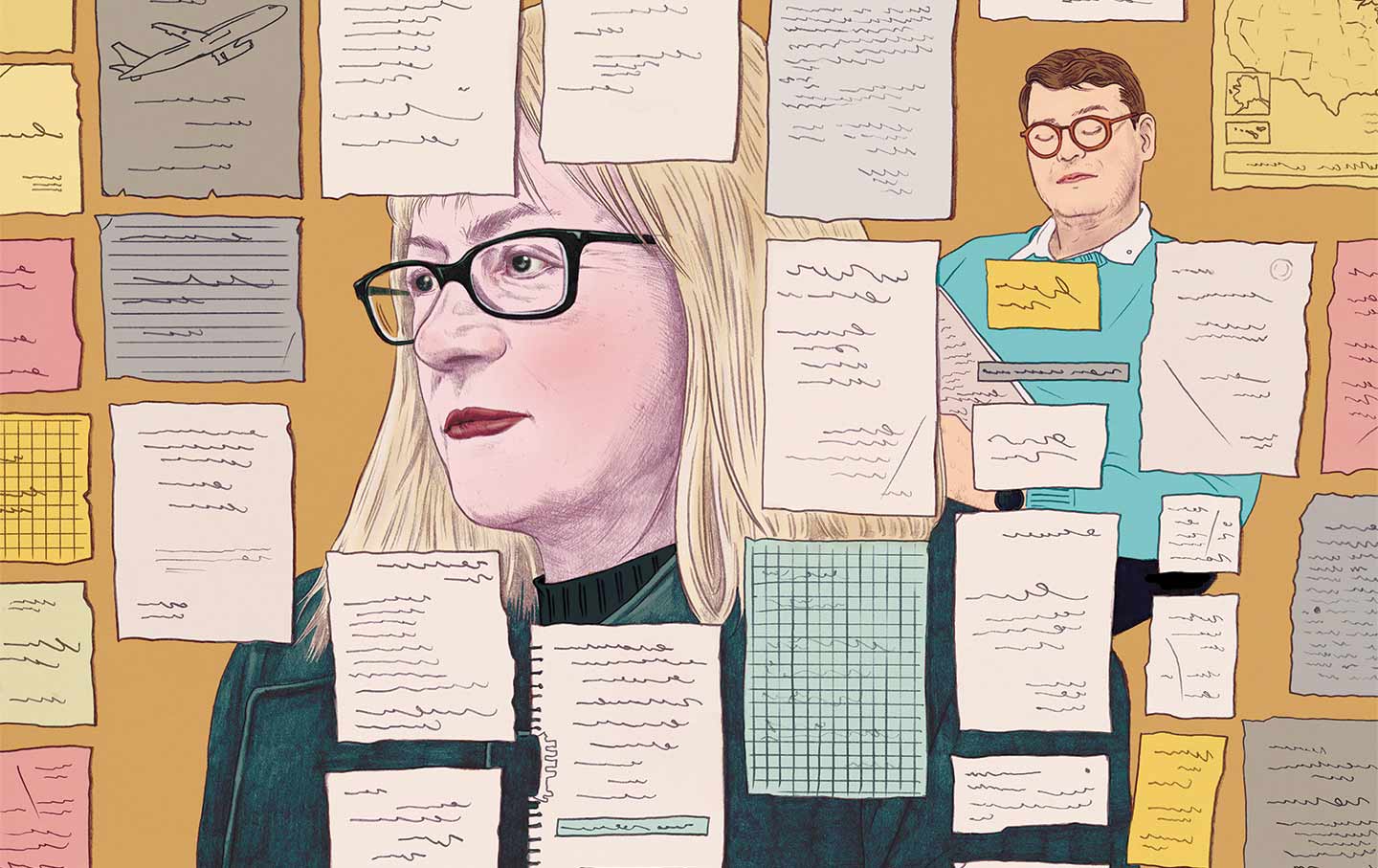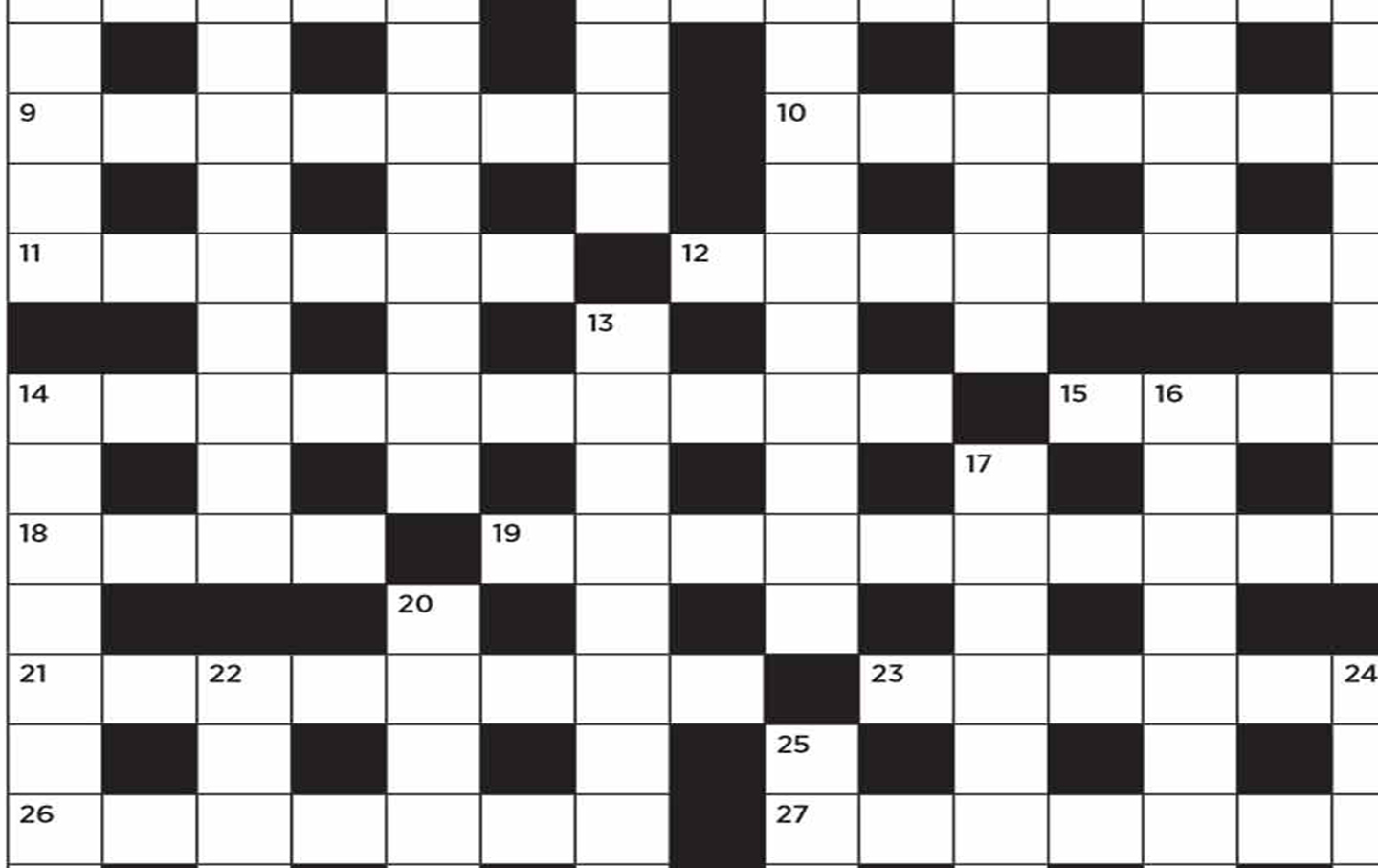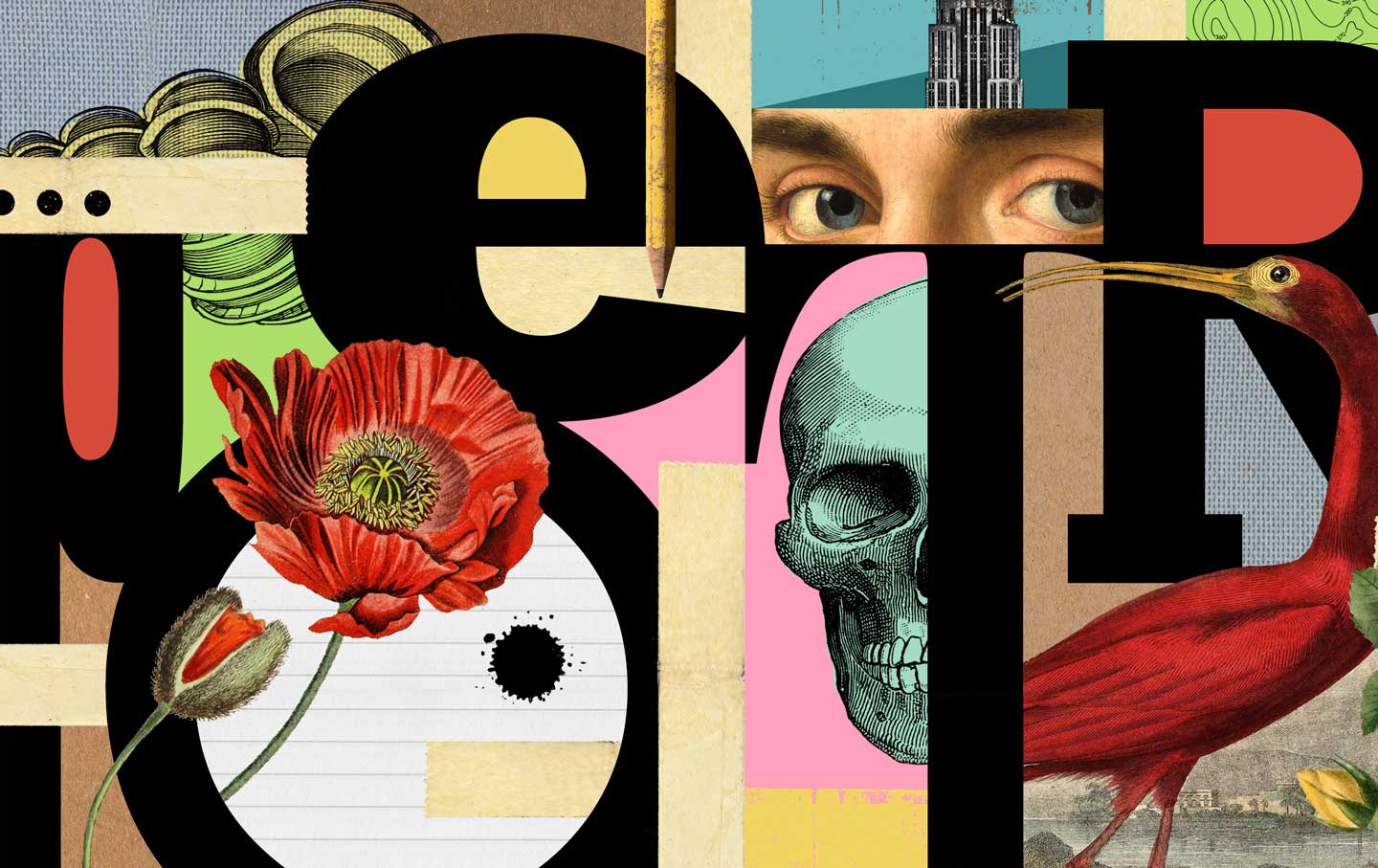A Perilous Activity
Lauren Oyler and literary criticism in the age of the Internet.
Lauren Oyler and the Critic in the Internet Age
In No Judgment, the novelist and critic explores the perilous activity of literary criticism in the era of social media.

Like many great literary critics before her, Lauren Oyler wrote a novel as her first book. Published in 2021, Fake Accounts followed an unnamed blogger living in Brooklyn who moves to Berlin after her boyfriend, an online conspiracy theorist, is apparently killed in a biking accident in the wake of Donald Trump’s election. Our Brooklyn blogger is supposedly grieving her loss, but she has another reason to flee the United States: She wants to leave her day job churning out “content” to become a more serious writer. Yet after setting herself up in Berlin, she mostly spends her time in bed, scrolling through Twitter and OkCupid. When she does finally leave her apartment, it is mostly to go on dates with random men to whom she lies about her identity “as a lighthearted experiment.”
Books in review
No Judgment
Buy this bookFake Accounts is about many things—how to navigate love and life as a writer with big ambitions, big frustrations, and limited resources—but it is also about how the Internet can get in the way of modern life. Oyler’s urbane urbanite simply cannot live without the World Wide Web, but can she find a way to live with it? Even her romantic prospects are stifled by the limitless opportunities to masquerade and hide from the difficulty of reality.
Oyler’s new essay collection, No Judgment, returns to many of these misgivings about the Internet age. The book’s topics range from vulnerability to autofiction to what it is like to live in Berlin and live with anxiety. Its references are historical as well as contemporary and often concern something that once went viral. Oyler invokes Nabokov and Elizabeth Hardwick as well as Brené Brown and Ben Lerner, but she also delves into the articles and ephemera that many of us have spent hours debating on Twitter and Slack.
No Judgment seeks to carve out a space beyond the world of the Internet, yet it can do so only by navigating through its portals. In this way, if Fake Accounts offered us a view from above of an Internet-addled culture, No Judgment gives us a look from within, taking as its subject not only today’s online culture but also how the writers tasked with assessing it have become caught up in the rat race themselves as they fight for clicks and careers and avoid being canceled.
No Judgment begins with an essay on gossip: how it plays out in small and large groups, how it is passed between people in person and online, and how none of us are immune from its temptations or consequences. Gossip, Oyler tells us, is more than a way for people to bond. In today’s digitized literary world—in which even the most private of writers must have some kind of public persona—it is a social and even professional currency. Gossip is no longer just gossip; it can help make or break one’s career.
Retelling the story of the media website Gawker, Oyler examines how gossip was transformed by the Internet, becoming something that, at least for the chattering classes, was far more significant than juicy whispers. Gawker, Oyler contends, demonstrated that gossip could be a way to build a business by capitalizing on the heightened visibility provided by the Internet, thereby becoming “a step in the process of news creation” itself. Yet Gawker also exemplified some of the pitfalls of gossip in an era of social media and litigious rich people: Having trafficked in online controversies, often in a prying, tabloid-like style, the website was eventually sued into oblivion for “invasion of privacy and emotional distress” by a much more powerful entity (Hulk Hogan, in a lawsuit bankrolled by Peter Thiel).
Offering another example of how gossip can be used to one’s advantage, Oyler discusses the #MeToo-era “Shitty Media Men” list, a spreadsheet that aggregated the names of men working at news organizations and magazines who were accused of everything from bad behavior to rape. For Oyler, the “Shitty Media Men” list demonstrated how gossip has mutated in the Internet age. Thanks to the Web’s public nature and permanence, the stakes are higher than they were in the past. The ease with which someone can become a public figure—whether as a journalist or an Instagram influencer or just some shitposter—increases the risk of “lawsuits, paranoia, uncertainty” and has resulted in “more than a few ruined careers and relationships.” Gossip has become not only an avenue for people to publicize themselves and their work but a way to lose their living, too. For Oyler, this is a shame: Gossip used to be fun, something you passed around at work or at parties with friends. Now it’s a perilous activity.
Turning from gossip to literary criticism, Oyler makes a similar argument concerning how we write about culture—and in particular literature—in an increasingly online world. Dissecting the website Goodreads and the other ranking systems that have proliferated online, Oyler notes that cultural criticism has become democratized—yet along with this has come an ecosystem in which quick thumbs-up-or-thumbs-down rating systems can carry as much, if not more, weight for publishers and the general reader than a long, interrogating essay or review.
One of Oyler’s primary sources for this argument is the writer Adam Dalva. His story begins with a rather absurd turn of events: Trying to be supportive, Dalva offered to review a friend’s novel on Goodreads. After said friend shrugged off the offer as unnecessary because Goodreads “doesn’t matter,” Dalva set out to show him why he was wrong. Spending just five minutes a day on the site, Dalva employed a game-theory-style method to figure out what kinds of books and posts would gain the most traction—and eventually became one of Goodreads’ top five globally ranked reviewers, receiving publicity offers, advance review copies, and an overwhelming number of invitations for free coffees from publishers. At the same time, Dalva was writing more substantive reviews for literary websites like Guernica. But when he informed a publisher about this work, he was told: “Your Goodreads review would matter exponentially more to us, because it is organic.”
Oyler, as a professional critic, obviously finds the proliferation and dominance of reader ratings—or what Dalva calls “customer experiences”—troubling in its own right, as they have come to supplant a lot of long-form criticism. But this is not the only reason, she argues, that criticism has suffered in the new digital age: Professional criticism has also come to censor itself. Reviewers writing in more mainstream venues such as The New York Times have a tendency to sanitize what they say, she notes—not because the reviewers aren’t professional writers, but precisely because they are. Authors of books themselves, they write their reviews with a certain sense of caution, if not fear: One day they are the critic, but the next day they could be the subject of criticism.
That fear, Oyler argues, has only increased in an ever more fraught political climate in which critics feel constantly surveilled. During the Trump years, writers felt more at risk of being attacked for their opinions. Worried about being lambasted online or even canceled for their writing, critics tried to make sure they adopted the “right” stance on everything. Of course, one could argue that criticism has never really been disconnected from politics. Even when it avoids engaging in politics directly—or maybe precisely because it avoids that engagement—it sets out a position of its own: namely, that art and culture can be siloed from the society in which they function. But Oyler’s point is slightly different: She argues that the critics who have joined the workforce in the age of Internet cancellation now feel that they have to be political; they cannot escape choosing a side. “What we like,” Oyler writes, has “become so enmeshed with our identities that an attack on our preferences came to feel like an attack on ourselves.”
In the book’s centerpiece essay, Oyler takes up the subject of autofiction and how the genre has been misunderstood in recent years. This essay, she tells us, was originally written as a kind of David Foster Wallace–style footnote for Fake Accounts that she ultimately cut from the novel. Yet it fits perfectly into No Judgment’s set of concerns.
Examining fiction by Ben Lerner, Sheila Heti, Karl Ove Knausgård, and Oyler herself, the essay asks why contemporary readers and writers have become so fixated on the genre. After all, what fiction doesn’t, in one way or another, borrow from life? Many other critics have taken up versions of this question—from Christian Lorentzen’s essay “Sheila Heti, Ben Lerner, Tao Lin: How ‘Auto’ Is ‘Autofiction’?” to Jessica Winter’s “Our Autofiction Fixation” to Katy Waldman’s “Has Self-Awareness Gone Too Far in Fiction?” But Oyler offers her own answer: Autofiction, she argues, may not be new as a form of writing, but its current popularity certainly is—along with the preoccupation with why this is so. For Oyler, the contemporary interest in autofiction is at least partly a result of how public our private lives have become. With so much of our biographies now out in the open, easily accessible and searchable to all who might inquire, novelists face a quandary: Ordinary readers are now so overloaded with information that they have simply become bored. In the age of the Internet, the possibilities of being entertained by the lives of others are literally endless.Autofiction functions as a way to sieve out the parts of life that are mundane and leave the pan filled only with gold.
Oyler cites Robert Kolker’s New York Times Magazine essay “Who Is the Bad Art Friend?” to explain how this kind of fiction is made. The essay, which once had certain corners of the Internet up in arms, is about two writers, one of whom writes a fictionalized version of the other’s curious decision to donate a kidney to a stranger and then tell everyone about it on social media. After Dawn Dorland, the woman who donated the kidney, read Sonya Larson’s story and realized that she was the inspiration for Larson’s character, she escalated the issue, and the two ended up in court. It didn’t help that a letter in Larson’s story was eerily similar to a Facebook post that Dorland had written. In his Times Magazine article, Kolker is more interested in the ethical questions prompted by Larson’s use of Dorland’s life. To Oyler, none of this matters: She contends that Larson should have edited the Facebook post to protect herself from a lawsuit, but in her view, Dorland’s decision to donate a kidney to someone she didn’t know and then flaunt it on social media was so bizarre that Larson had an imperative to steal it for her story. Transforming the interesting elements of someone’s life into art is the formula for making good fiction—even if Larson doesn’t always succeed.
When Fake Accounts came out, in 2021, critics seemed unable to call it anything other than “an Internet novel,” usually while also discussing Patricia Lockwood’s No One Is Talking About This, which was published the same month. “Two Paths for the Extremely Online Novel” read a Wired headline; “What Can the Modern Novel Tell Us About Life in the Age of the Internet?” read another in The Guardian. Yet another piece hailed “the month of the Internet novel.” All of these reviews argued something similar: that these novels not only featured protagonists who spend their time scrolling through and thinking about social media sites but that they also captured a particular kind of anxiety created and mediated by online communication.
Popular
“swipe left below to view more authors”Swipe →There is something to these assessments, though one wonders whether all realist novels written today could be considered “Internet novels” if they aim to capture contemporary life and the way we move through it. But the reviewers were not wrong in observing that underlying Fake Accounts is an obsession with the Internet, especially how it shapes writing today, including literature and reviews of it—and this interest and ambivalence persist throughout No Judgment.
For Oyler, the Internet has affected writers mostly for the worse. It has caused them to shy away from originality, to fear condemnation and censorship, and to prioritize safety over creative risk-taking. But as one reads the essays in No Judgment, one also gathers how vital the Internet is to Oyler’s own writing: It helps her, as a critic of literature and culture, figure out what her peers—and her enemies—are thinking about. It serves as an aggregation tool to find examples that illustrate her arguments and becomes something like a cultural barometer. Using social media in particular, Oyler can take a longer view of the stories that people are gravitating toward and the conversations they are having about them.
If you are a person who spends an inordinate amount of time reading articles you found through X (né Twitter), you will likely be familiar with many, if not all, of Oyler’s reference points in No Judgment. One effect of this is that many of her readers will not be entirely surprised by the New Yorker essays or Internet controversies she discusses: Most of these stories, and even some of the arguments people have made about them, are not exactly new. But the other effect of these citations is that they produce the realization that the Internet and its tendency toward virality creates a sort of pruning effect that no critic, Oyler included, can ignore. Considering all of the insights that No Judgment generates by evaluating these texts, one begins to wonder if the Internet might not necessarily be such a bad thing.
Along with the homogenization, anxiety, and fears of cancellation and surveillance that the Internet encourages, it can also serve as a place where the literary set can congregate and discuss a common set of texts. It is indeed a place that can make people a little more panicked, a little more self-conscious, and even a little more depressed. But it can also draw us out into a capacious public space.
One of the first thoughts I had while reading No Judgment was that the collection might be a version of Mark Greif’s Against Everything for the 2020s. But as I read, and read again, Oyler’s book turned out to be something not so negative after all.
Disobey authoritarians, support The Nation
Over the past year you’ve read Nation writers like Elie Mystal, Kaveh Akbar, John Nichols, Joan Walsh, Bryce Covert, Dave Zirin, Jeet Heer, Michael T. Klare, Katha Pollitt, Amy Littlefield, Gregg Gonsalves, and Sasha Abramsky take on the Trump family’s corruption, set the record straight about Robert F. Kennedy Jr.’s catastrophic Make America Healthy Again movement, survey the fallout and human cost of the DOGE wrecking ball, anticipate the Supreme Court’s dangerous antidemocratic rulings, and amplify successful tactics of resistance on the streets and in Congress.
We publish these stories because when members of our communities are being abducted, household debt is climbing, and AI data centers are causing water and electricity shortages, we have a duty as journalists to do all we can to inform the public.
In 2026, our aim is to do more than ever before—but we need your support to make that happen.
Through December 31, a generous donor will match all donations up to $75,000. That means that your contribution will be doubled, dollar for dollar. If we hit the full match, we’ll be starting 2026 with $150,000 to invest in the stories that impact real people’s lives—the kinds of stories that billionaire-owned, corporate-backed outlets aren’t covering.
With your support, our team will publish major stories that the president and his allies won’t want you to read. We’ll cover the emerging military-tech industrial complex and matters of war, peace, and surveillance, as well as the affordability crisis, hunger, housing, healthcare, the environment, attacks on reproductive rights, and much more. At the same time, we’ll imagine alternatives to Trumpian rule and uplift efforts to create a better world, here and now.
While your gift has twice the impact, I’m asking you to support The Nation with a donation today. You’ll empower the journalists, editors, and fact-checkers best equipped to hold this authoritarian administration to account.
I hope you won’t miss this moment—donate to The Nation today.
Onward,
Katrina vanden Heuvel
Editor and publisher, The Nation
More from The Nation

Rob Reiner’s Legacy Can't Be Sullied by Trump’s Shameful Attacks Rob Reiner’s Legacy Can't Be Sullied by Trump’s Shameful Attacks
The late actor and director leaves behind a roster of classic films—and a much safer and juster California.

Helen DeWitt and Ilya Gridneff’s Sweeping Anti-War Novel Helen DeWitt and Ilya Gridneff’s Sweeping Anti-War Novel
Your Name Here dramatizes the tensions and possibilities of political art.
Solution to the “Big Event” Crossword Solution to the “Big Event” Crossword
If questions remain after reading this, please write to sandy @ thenation.com.

Blood Orange’s Sonic Experiments Blood Orange’s Sonic Experiments
Dev Hynes moves between grief and joy in Essex Honey, his most personal album yet.




